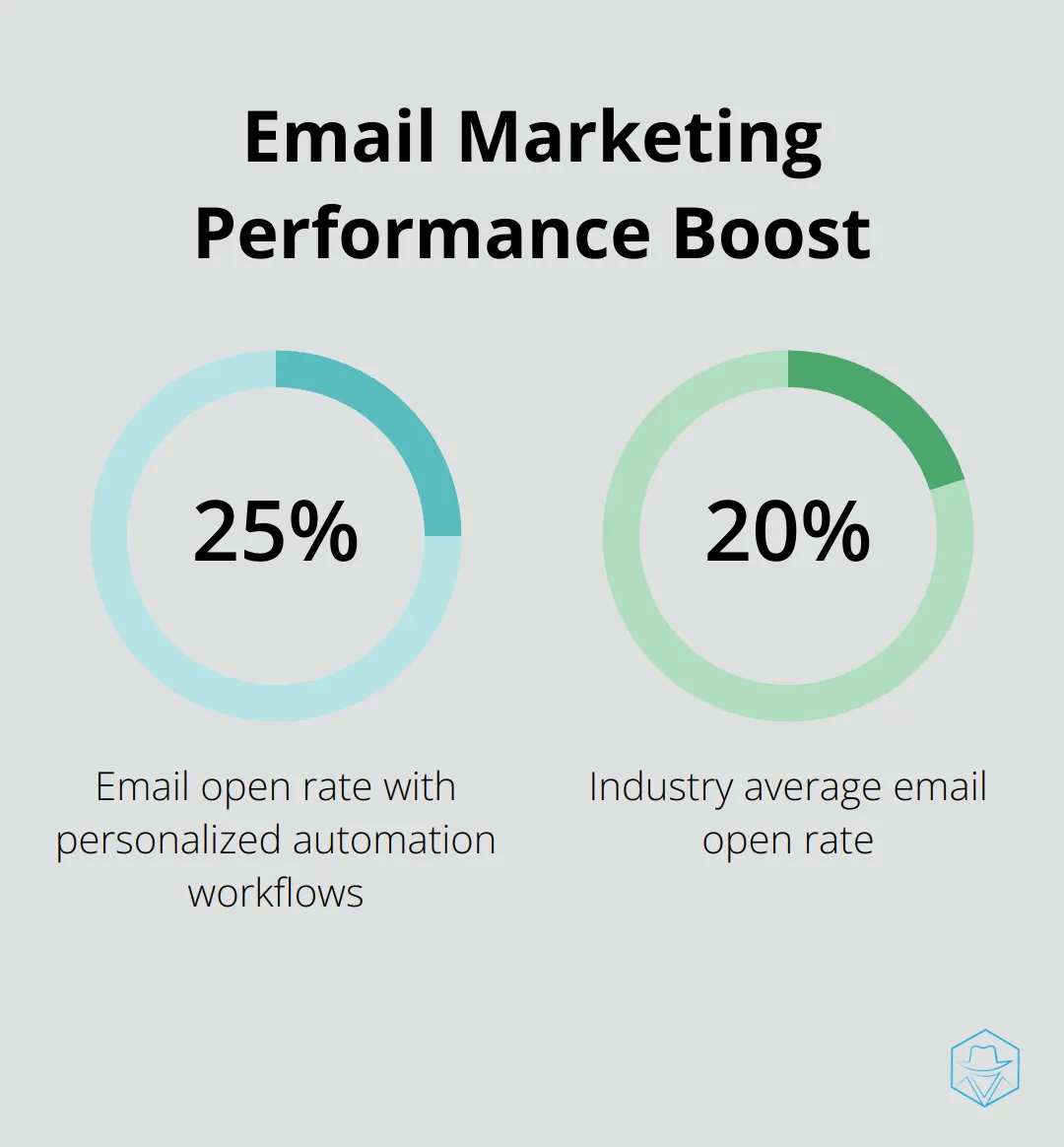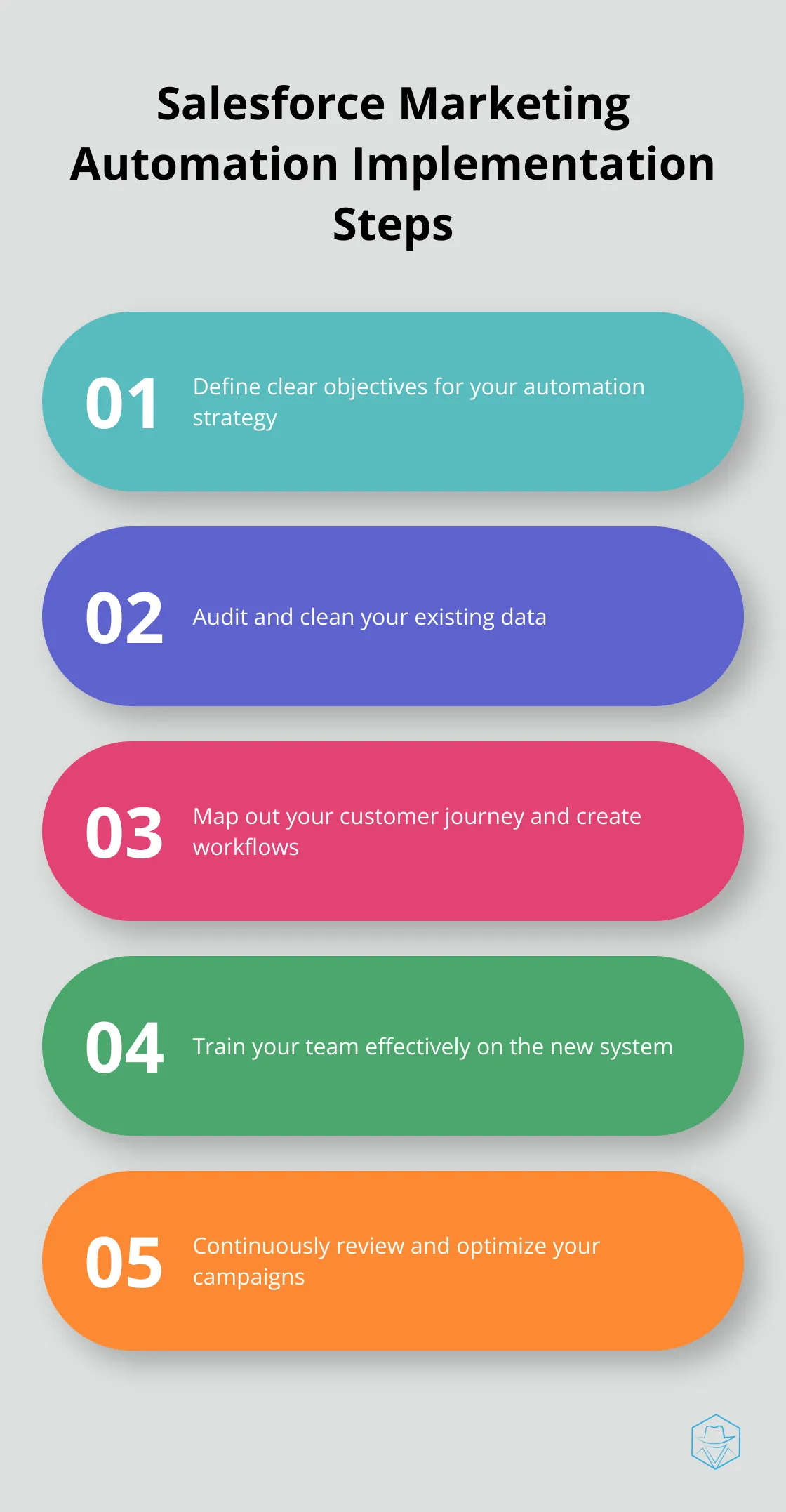Marketing Automation for Salesforce: A Complete Guide

Marketing automation for Salesforce is revolutionizing how businesses interact with their customers. This powerful tool streamlines marketing processes, enhances customer engagement, and drives revenue growth.
At Drop Cowboy, we’ve seen firsthand how integrating marketing automation with Salesforce CRM can transform a company’s marketing efforts. In this comprehensive guide, we’ll explore the essential features, implementation strategies, and best practices for leveraging Salesforce marketing automation to its fullest potential.
What Is Marketing Automation in Salesforce?
The Core of Salesforce Marketing Automation
Marketing automation in Salesforce transforms how businesses approach their marketing efforts and customer engagement. This powerful system combines customer data, marketing workflows, and communication channels into one cohesive platform. It goes beyond simple email sending; it creates personalized customer journeys that respond to individual behaviors and preferences.
Consider this scenario: A potential customer downloads a whitepaper from your website. Salesforce automatically adds them to a nurture campaign, sends follow-up emails, and alerts sales reps to reach out at the optimal time. This automation ensures that every lead receives attention and every interaction happens at the right moment.
Seamless CRM Integration
The integration of marketing automation with Salesforce CRM creates a single source of truth for customer data. This integration allows marketers to use sales and service information to create more targeted campaigns.
For example, if a customer contacts support about a specific product issue, the system can pause promotional emails for that product to that customer (avoiding potential frustration). This level of coordination between departments was previously unattainable without significant manual effort.
Tangible Benefits for Businesses
Businesses that use Salesforce marketing automation often see substantial improvements in their marketing ROI. A study by Nucleus Research found that marketing automation drives a 14.5% increase in sales productivity and a 12.2% reduction in marketing overhead.
Some companies achieve email open rates exceeding 25% after implementing personalized automation workflows in Salesforce. This surpasses the industry average of around 20% (as reported by Campaign Monitor).
The time saved on manual tasks is also significant. According to a survey by Adestra, marketers save an average of 6 hours per week when they use marketing automation tools. This time can be reinvested in developing more strategic, creative campaigns that drive better results.

Personalization at Scale
One of the most powerful aspects of Salesforce marketing automation is its ability to deliver personalized experiences to a large audience. By using customer data and behavior patterns, businesses can create highly targeted campaigns that resonate with individual customers.
An e-commerce company using Salesforce can automatically send personalized product recommendations based on a customer’s browsing history, purchase patterns, and demographic information. This level of personalization can significantly increase conversion rates and customer loyalty.
The Power of AI in Marketing Automation
Artificial Intelligence (AI) plays a crucial role in enhancing the capabilities of Salesforce marketing automation. AI-powered features like predictive analytics and smart content creation take personalization and efficiency to new heights.
For instance, AI can analyze past customer interactions to predict future behavior, allowing marketers to proactively engage customers with the right message at the right time. This predictive capability (combined with automation) creates a powerful tool for increasing customer engagement and driving sales.
As we explore the essential features of Salesforce marketing automation in the next section, you’ll see how these components work together to create a comprehensive marketing solution.
Powerful Features of Salesforce Marketing Automation
Salesforce Marketing Automation offers a robust set of features that can significantly enhance your marketing efforts. Let’s explore some of the most impactful capabilities that can drive your business forward.
Advanced Lead Management
Salesforce’s lead scoring and nurturing capabilities transform how businesses handle potential customers. The platform uses AI-powered algorithms to analyze lead behavior, assigning scores based on actions like website visits, email interactions, and content downloads. This allows sales teams to focus on the most promising leads, increasing conversion rates.
A B2B software company using Salesforce reported a 20% increase in qualified leads after implementing automated lead scoring. The system identified high-value prospects based on their engagement with specific product pages and webinar attendance, allowing the sales team to prioritize their outreach effectively.
Sophisticated Email Marketing
Email remains a cornerstone of digital marketing, and Salesforce elevates it to new heights. The platform’s email marketing tools offer dynamic content insertion, A/B testing, and send-time optimization (features that go beyond basic scheduling and sending).
A retail client using Salesforce’s email marketing features saw a 15% increase in email open rates by leveraging send-time optimization. The system analyzed each recipient’s past behavior to determine the optimal time to send emails, resulting in higher engagement.

Hyper-Personalization Capabilities
Salesforce’s customer segmentation and personalization features enable marketers to create highly targeted campaigns. The platform can segment audiences based on a wide range of criteria, including demographics, behavior, purchase history, and even predictive factors.
A travel company using Salesforce increased their email click-through rates by 30% by sending personalized destination recommendations based on customers’ past travel history and browsing behavior.
Data-Driven Decision Making
The analytics and reporting capabilities in Salesforce Marketing Automation are extensive. Marketers can access real-time dashboards showing campaign performance, customer journey analytics, and ROI metrics. These insights enable quick adjustments to optimize campaigns on the fly.
A SaaS company used Salesforce’s analytics to identify that their blog content drove more conversions than their paid ads. This insight allowed them to reallocate their budget, resulting in a 25% increase in lead generation while reducing marketing spend.
Complementary Communication Channels
While Salesforce offers powerful features, it’s important to note that other platforms can provide unique capabilities to complement Salesforce’s offerings. For instance, Drop Cowboy stands out with its ringless voicemail and SMS integration features. These additional channels can significantly boost engagement rates in your marketing campaigns (often achieving high return call rates and amplifying campaign reach).
As we move forward, we’ll explore how to implement these powerful features effectively in your Salesforce marketing automation strategy. The next section will guide you through the steps to set up and optimize your marketing automation processes.
How to Implement Marketing Automation in Salesforce
Implementing marketing automation in Salesforce transforms businesses’ marketing efforts and boosts ROI. This process requires careful planning and execution to achieve optimal results.
Define Clear Objectives
The first step in implementing marketing automation is to establish clear goals. Determine whether you want to increase lead generation, improve customer retention, or boost sales. Your objectives will guide your setup process and help measure success.
Audit and Clean Your Data
Before diving into automation, conduct a thorough audit of your existing data. Remove duplicates and outdated information from your database. This step is essential for effective segmentation and personalization in your future campaigns.
Map Your Customer Journey
Identify key touchpoints in your customer’s journey and create automated workflows for each stage. Set up a welcome series for new subscribers, a re-engagement campaign for inactive customers, and a cross-sell campaign for existing customers. This approach ensures a personalized experience throughout the customer lifecycle.
Overcome Implementation Challenges
One major hurdle in implementing marketing automation is resistance to change. To combat this, involve key stakeholders early in the process. Show the potential ROI and efficiency gains to secure buy-in from all departments.
Data silos present another common challenge. Salesforce’s integration capabilities can help break down these silos, but it requires consistent effort to ensure all departments input and access data uniformly.
Many businesses also struggle with content creation for automated campaigns. Start by repurposing existing content and gradually build a content library aligned with your customer journey. This strategy allows you to maintain a steady flow of relevant content without overwhelming your team.
Train Your Team Effectively
Effective training is key to successful adoption. Start with a core team of power users who can then train others in their departments. Salesforce’s Trailhead platform offers excellent resources for self-paced learning.
Schedule regular check-ins and refresher sessions to address any issues and share best practices. Consider creating an internal knowledge base where team members can share tips and troubleshoot common problems.
Complement with Specialized Tools
While Salesforce offers robust marketing automation features, consider complementing it with specialized tools for specific channels. For instance, Drop Cowboy’s ringless voicemail and SMS capabilities can significantly enhance your multi-channel marketing efforts, providing unique ways to engage your audience beyond email.
Implementing marketing automation is an ongoing process of optimization. Regularly review your automated campaigns, A/B test different elements, and refine your approach based on the data. This continuous improvement cycle will help you maximize the benefits of your Salesforce marketing automation implementation.

Final Thoughts
Marketing automation for Salesforce has become an essential tool for businesses to streamline processes, enhance customer engagement, and drive revenue growth. Companies can create personalized customer journeys, optimize lead management, and make data-driven decisions that propel their marketing efforts forward. The future of marketing automation will likely see AI and machine learning play an even more significant role in predictive analytics and personalization.
Businesses should act now to implement Salesforce marketing automation. This process starts with defining clear objectives, cleaning data, and mapping the customer journey. Overcoming common challenges requires securing stakeholder buy-in, breaking down data silos, and investing in comprehensive team training (an ongoing process of refinement and optimization).
While Salesforce offers comprehensive tools, specialized platforms can enhance specific channels. Drop Cowboy provides unique capabilities in ringless voicemail and SMS marketing, which can boost customer engagement rates. This combination of Salesforce and targeted solutions allows businesses to create more efficient, effective, and personalized marketing campaigns.
blog-dropcowboy-com
Related posts

April 2, 2025
Automation Marketing Strategy: Boost Your ROI
Boost ROI by adopting an automation marketing strategy. Discover practical tools and trends for effective marketing automation today.

March 7, 2025
Proven Text Marketing Strategies for Business Growth
Boost growth with proven text marketing strategies. Engage customers effectively and elevate your business with practical, data-driven insights.

April 9, 2025
How AI Enhances Marketing Automation Strategies
Boost marketing automation with artificial intelligence to streamline campaigns, enhance customer engagement, and improve overall business efficiency.

March 13, 2025
Voicemail drops
Explore how voicemail drops can enhance your communication strategy and improve engagement with tips from industry experts.

March 10, 2025
Top Free Text Marketing Platforms for Small Businesses
Explore top free text marketing platforms for small businesses to boost engagement and reach your audience effectively.

April 8, 2025
Marketing Automation Classes: What to Expect
Explore what a marketing automation class offers. Gain practical skills and knowledge to enhance your marketing strategy effectively.